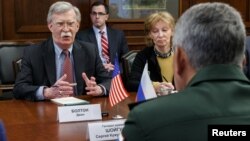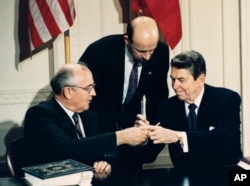Russian President Vladimir Putin hosted a senior White House envoy on Tuesday as the U.S. affirmed President Donald Trump’s intention to exit a landmark nuclear treaty amid charges of violating the agreement.
US National Security Advisor John Bolton’s meeting with the Russian leader capped two days of talks with senior Kremlin officials aimed at paving the way for the United States’ withdrawal from the Intermediate-Range Nuclear Forces Treaty.
The deal, brokered between President Ronald Reagan and Soviet leader Mikhail Gorbachev in 1987, required the elimination of all short- and intermediate-range land-based nuclear and conventional missiles in Europe — then divided by the world’s two great superpowers.
For now, the U.S. has yet to formally exit the agreement. Yet Bolton left no doubt that the move was imminent.
“The INF is ignored and outmoded,” said Bolton. “It’s a Cold War treaty for a multipolar world.”
President Trump has justified the withdrawal by pointing to a recent history of Russian transgressions — a charge Moscow has repeatedly levied against Washington.
“Russia has not, unfortunately, honored the agreement,” said Mr. Trump, in comments at a political rally over the weekend. “So we’re going to terminate the agreement and we’re going to pull out.”
“Until people come to their senses — we have more money than anybody else, by far,” added the American leader.
Bolton echoed that rationale before reporters again in Moscow.
“This question of Russian violations is long and deep,” said Bolton, noting that Russian violations had dated back to the Obama administration.
“The threat is not America’s INF withdrawal from the treaty. The threat is Russian missiles already deployed.”
Arms race 2.0?
From President Putin on down, Kremlin officials have repeatedly warned any new U.S. arms deployments that result from the treaty’s collapse will be met in kind.
Such exchanges have unnerved key European allies — including Germany and France — who fear a return to the days of the Cold War when Europe served as a nuclear sparring ground between the world’s two superpowers.
Other American allies, such as Poland and England, have voiced support for the move.
Yet behind the U.S. decision: the growing military capabilities of nations not included in the INF — such as China and Iran.
“One-third to one-half of Chinese missiles today would violate the INF,” argued Bolton.
“Exactly one country is constrained by the INF treaty: the United States.”
Thou doth protest too much?
In Moscow, debate has centered on whether the Kremlin tacitly achieved its aim — or doom — by prompting the U.S. withdrawal of a treaty in lieu of NATO’s subsequent expansion into Eastern Europe.
“For Russia, it’s beneficial to have in its arsenal a class of nuclear and strategic weapons to combat regional threats without the distraction of the limitations of the strategic arsenal aimed at the USA,” argues independent analyst Vladimir Frolov in the online publication Republic.
“It’s a big diplomatic accomplishment for Vladimir Putin,” he added.
“It’s sad to watch,” countered opposition activist Vladimir Milov in a Facebook post. “Trillions and trillions will be thrown to the wind.”
“The decades-old system of global security is being destroyed before our eyes, and will not be easy to resuscitate.”
Either way, the Kremlin seemed eager to embrace Bolton’s visit — the second in the past 4 months — as a willingness to engage despite ongoing allegations of Russian interference in the 2016 US presidential elections.
“We barely respond to any of your steps but they keep on coming,” said President Putin, joking to Bolton before cameras at the Kremlin in a reference to U.S.-Russian tit-for-tat sanctions over ongoing allegations of election meddling.
In turn, Bolton argued Russia’s actions had not changed the outcome of the 2016 race. Rather they’d made it all but impossible for progress in U.S.-Russian relations.
The two sides, noted Bolton, did make progress on reinstating cooperative efforts relative to terrorism, Syria, and North Korea. And, President Trump had accepted Putin’s offer to meet on the sidelines of the upcoming celebrations of the 100th anniversary of the armistice marking the end of World War I in Paris in November.
But much hinges on how the U.S. views Russian cyber activities ahead of an already charged political season when Americans head to the polls November 6th for midterm elections.
Depending on how things go, warned Bolton, the U.S. position could change “with a keystroke.”






